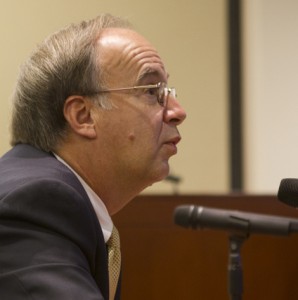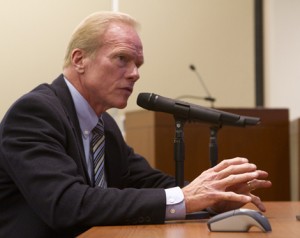How Clark County’s economic climate will fare over the next 20 years was the billion-dollar question hanging in the air during a special day-long session the Washington State Transportation Commission held on Nov. 14 at the Port of Vancouver.
The seven-member commission sets tolls for state roadways, bridges, and ferries and also advises the governor and state legislature on transportation policy. The visit was part of the commission’s efforts to learn about local transportation issues around the state.
The commission heard presentations from officials representing the City of Vancouver, Clark County, C-Tran, the Port of Vancouver, and the Washington Department of Transportation (WSDOT), among others, regarding their perceptions of transportation needs in Clark County.
Investment in transportation urged
In general, speakers said maintaining and expanding transportation infrastructure – be it roads, interchanges, or the proposed $10 billion* Columbia River Crossing/Light Rail project – was a priority, even in the face of shrinking revenues. They argued such investment would pay off by spurring economic growth.
“You have to invest in your future, and that’s what is going to draw the jobs, and, I believe, ultimately provide the opportunity for the tax base to increase and provide those other benefits, including education,” said Larry Paulson, executive director of the Port of Vancouver.
Washington State’s transportation budget for the 2011-2013 biennium budget is $9 billion, 14 percent of the overall state budget. More than half of the transportation dollars come from state and federal gas taxes.
The transportation commission estimates the state will need at least $175 to $200 billion dollars over the next 20 years to meet transportation needs. However, since 2000, gas usage in the state has steadily dropped to mid-1990 levels, making future gas tax revenue less certain. Nonetheless, the commission was committed to, at the least, maintaining the capacity of the transportation system.
“We’re not going to give up on transportation investments, even though we see our ability declining with the revenues in hand,” said State Transportation Secretary Paula Hammond, who serves as an ex officio member of the Transportation Commission. “We have to keep the state’s transportation system strong or our economy is going to struggle in its recovery.”
WSDOT facing job cuts
The prospect of declining revenues wasn’t lost on Don Wagner, the administrator of the Southwest Region of WSDOT. Wagner told the commission that his office is in the midst of a construction boom that is set to come to a complete standstill in two years.
Wagner’s department is on target to complete nearly 49 highway projects by 2013 – at a total budget of $970 million – within the seven southwestern counties in his region. These will include four projects in Clark County to improve interchanges and widen the I-5 corridor between Salmon Creek and the Columbia River to accommodate three through lanes, with additional add / drop lanes.
In all, the Southwest Washington WSDOT office will have managed 27 projects in 2011, at a budget of $121 million, with an even larger budget next year. Nonetheless, Wagner said there are currently no new projects funded for 2013. If nothing changes, he will have to trim his 500-member staff by 20 percent, including more than 80 engineers.
“The two largest construction seasons this region has ever seen are at a time when I’m trying to figure out how to downsize,” said Wagner.
Officials back CRC
Most of the invited speakers were strong advocates of the Columbia River Crossing/Light Rail project (CRC), claiming it would play a central role in improving local freight traffic and safety between Vancouver and Portland.
The CRC is a five-mile long highway project that would replace the existing Interstate Bridges with a two-level span for vehicles, light rail, and pedestrians. Construction would also alter highway interchanges from North Portland to State Route 500 in Vancouver. The project’s final environmental impact statement is awaiting approval this fall from the federal government, after which CRC planners can pursue financing.
“Continuing the support and securing funding for the I-5 bridge is the single most critical infrastructure item that we have in Clark County,” said Eric Fuller, the chair of Columbia River Economic Development Council and a Vancouver-based commercial real estate broker.
CRC planners expect taxpayers to pay for two-thirds of the project through federal and state funds. Drivers will pay the balance of more than $1 billion through tolls. The transportation commission would set those tolls following an investment-grade analysis of traffic flows.
“We step in and say this is how much the federal [government] has provided, this is how much the state has provided, and then here is the balance that you need to toll,” said Philip Parker, a retired electrician who represents Clark County on the Transportation Commission.
Members of the commission acknowledged the tension between funding such a major construction project when it could mean taking away funds from other essential state services, but they didn’t openly challenge the CRC project.
Commission chair Dick Ford, a retired attorney from Seattle, said it is crucial, however, that CRC planners not oversell the project to citizens, who will likely be upset if they have to pay tolls for a project that doesn’t live up to expectations.
“We have to make sure the public is aware of the limitations,” he said. “[Make sure] there’s no hidden agendas that they wake up to after the fact.”
Public questions CRC construction
When it came time for public comment, the commission got a sense of the level of opposition that exists toward the CRC and tolling.
Sharon Nasset, a Portland resident who supports building a third bridge across the Columbia River, alerted the commission to a growing lack of support for the existing CRC project among Oregon legislators. She also alleged her “third bridge alternative” was never adequately studied during the CRC planning process.
“They will say that it was, but it wasn’t,” Nasset said.
State representative Paul Harris, R-Vancouver, said he represents about 20,000 people in the 17th District who regularly commute to Portland. While the recent toll-related ballot Initiative 1125 failed statewide, it passed by 70 percent in his district. Harris interpreted that to mean his constituents are very concerned about tolling.
Harris said that when he commutes across the Interstate Bridge, the congestion builds up farther south in Portland, not at the bridge itself. He’s not convinced the CRC will adequately address traffic problems and that forcing commuters to pay tolls will only add to their frustration.
“Don’t be under the impression that if you build this bridge, congestion is going away,” said Harris. “I think there is going to be some angst from my voters – and I really think that’s what this was. To pay…what they’re hoping is a dollar or two to be caught in traffic kind of rubs them wrong. Right now they’re stuck in traffic, but it doesn’t cost them anything.”
Another citizen, Vancouver forensic accountant Tiffany Couch, explained that she had uncovered some questionable transactions related to the CRC and urged the commission to meet with her in person so she could share what she had learned.
Ford interrupted. “I have to ask you. Are you accusing these people of fraud?”
“I’m not,” said Couch.
Not entirely convinced, Ford said Couch should speak with the state attorney general’s office or the police to address the issues she was raising.
“I’m sorry, we’re not the agency you should talk to,” Ford said.
* The well-documented cost to taxpayers, if the CRC stays on budget, is $10 billion. This was established by the Cortright Report (PDF) which used data from an independent review panel hired by the governors of Washington and Oregon. (View the panel’s final report.)
See our continuing coverage of the Columbia River Crossing Light Rail project.
Do you have information to share on the CRC? To respond anonymously call 260-816-1426. To allow your comments to be used on COUV.COM call 260-816-1429.












